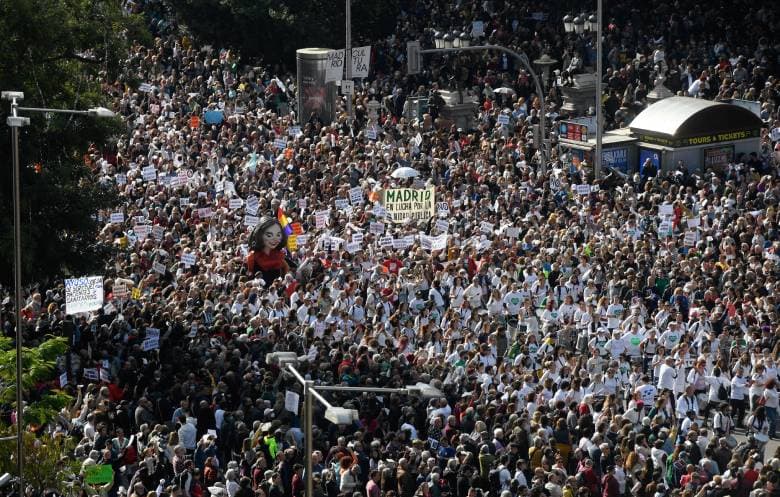Thousands rally in defence of Madrid public healthcare

At least 200,000 demonstrators rallied in Madrid on Sunday in defence of the region's primary care, warning plans to overhaul the system would "destroy" local healthcare.
Hundreds of thousands of demonstrators rallied in Madrid on Sunday in defence of the region's primary care services, warning plans to overhaul the system would "destroy" local healthcare.
On a sunny afternoon, huge crowds rallied at four points across the capital and marched on city hall in a mass protest under the slogan: "Madrid rallies in support of public healthcare and against the plan to destroy primary care services."
Primary care services in the Madrid area have been under huge pressure for years due to a lack of resources and staff, with the situation worsened by poor regional management, unions say. A regional government spokesman said there were 200,000 people.
"Healthcare for all, your health should never depend on your wallet," read one huge green banner as thousands of voices chanted "Public healthcare!"
The protest convened by local associations and municipalities takes aim at the health policies of the regional government of right-wing leader Isabel Diaz Ayuso -- including a push for public-private healthcare partnerships and its restructuring of primary care.
READ ALSO: Why Spain is running out of doctors
The protest comes ahead of a planned strike by nearly 5,000 regional family doctors and paediatricians scheduled for November 21, due to "the overload of work, endless appointments and lack of time with patients."
They will join an earlier strike by medical staff over the new model for non-hospital emergency centres, which have seen some offering only video consultations due to a lack of staff.
Speaking to reporters at the rally, Monica Garcia of the hard-left Más Madrid party said the health policy of the regional government, which is run by the right-wing Popular Party (PP), was destroying the public health system. "What they are doing is an unprecedented disaster," she said.
"Ayuso needs to step up, listen to this demonstration and take political responsibility: either her health minister goes or she goes, or the whole Popular Party government goes," she said.
"There is a very simple way to retain professionals and that is to treat them well: give them contracts that are not just for a month, a week, a weekend. When a government is incapable of doing this, it is because there are political interests at work."
Comments
See Also
Hundreds of thousands of demonstrators rallied in Madrid on Sunday in defence of the region's primary care services, warning plans to overhaul the system would "destroy" local healthcare.
On a sunny afternoon, huge crowds rallied at four points across the capital and marched on city hall in a mass protest under the slogan: "Madrid rallies in support of public healthcare and against the plan to destroy primary care services."
Primary care services in the Madrid area have been under huge pressure for years due to a lack of resources and staff, with the situation worsened by poor regional management, unions say. A regional government spokesman said there were 200,000 people.
"Healthcare for all, your health should never depend on your wallet," read one huge green banner as thousands of voices chanted "Public healthcare!"
The protest convened by local associations and municipalities takes aim at the health policies of the regional government of right-wing leader Isabel Diaz Ayuso -- including a push for public-private healthcare partnerships and its restructuring of primary care.
READ ALSO: Why Spain is running out of doctors
The protest comes ahead of a planned strike by nearly 5,000 regional family doctors and paediatricians scheduled for November 21, due to "the overload of work, endless appointments and lack of time with patients."
They will join an earlier strike by medical staff over the new model for non-hospital emergency centres, which have seen some offering only video consultations due to a lack of staff.
Speaking to reporters at the rally, Monica Garcia of the hard-left Más Madrid party said the health policy of the regional government, which is run by the right-wing Popular Party (PP), was destroying the public health system. "What they are doing is an unprecedented disaster," she said.
"Ayuso needs to step up, listen to this demonstration and take political responsibility: either her health minister goes or she goes, or the whole Popular Party government goes," she said.
"There is a very simple way to retain professionals and that is to treat them well: give them contracts that are not just for a month, a week, a weekend. When a government is incapable of doing this, it is because there are political interests at work."
Join the conversation in our comments section below. Share your own views and experience and if you have a question or suggestion for our journalists then email us at [email protected].
Please keep comments civil, constructive and on topic – and make sure to read our terms of use before getting involved.
Please log in here to leave a comment.